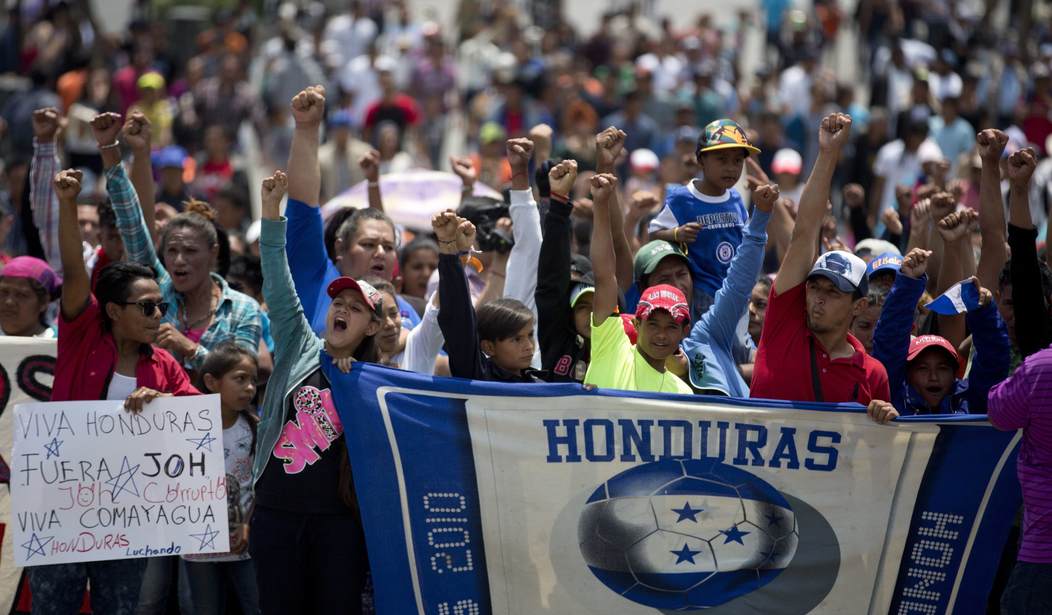Globalization isn’t going quite according to plan. The French president, in defiance of political correctness openly worries African immigration could swamp the whole of Europe and “aid” is powerless to stop it. “The challenge of Africa is completely different, it is … civilizational … failing states, complex democratic transitions, the demographic transition … in some countries today seven or eight children [are] born to each woman,” Emmanuel Macron said. It is one more indication, as Ross Douthat of the New York Times notes, that Western leaders are starting to worry that their assumptions about the global world could prove drastically wrong.
African birthrates haven’t slowed as fast as Western experts once expected … by century’s end two in five human beings could be African … but … over the same period, Europe’s population is likely to drop by about 100 million. … the experience of recent refugee crises has demonstrated to European leaders both how easily populations can move northward, and how much harder assimilation may be than they once hoped.
Projections that underpinned the liberal policies of population control, climate change, open borders, soft power are now suspect. Open borders advocates wait with bated breath as central American refugee “caravans” headed for the United States in a replay of the migrant crisis that changed the political landscape Europe. Even a giant column from Honduras wound towards the US border yet another U.S.-bound caravan was taking shape in El Salvador. “As the Trump administration makes preparations to combat the 6,500-member Honduran migrant caravan making its way toward the United States, the Department of Homeland Security is also tracking a new caravan taking shape — this time from El Salvador.”
Ironically the caravans could wind up boosting Donald Trump the way the European refugee flows crippled Angela Merkel. Her position as “Leader of the Free World” now seems over as “her junior coalition partners, the center-left Social Democrats (SPD), saw support in Bavaria halved.” It would be one more hint that liberal policy analysts miscalculated badly.
Just how weak the globalist orthodoxy has now become was illustrated by Italy’s budgetary defiance of the European Union. “In what is becoming a dangerous game of chicken for the global economy, Italy’s populist government refused to budge on Tuesday after the European Union for the first time sent back a member state’s proposed budget because it violated the bloc’s fiscal laws and posed unacceptable risks.” The Atlantic notes that far from being fearful of Brussels the Italians are raring for a fight. The Independent suggests that Rome’s open revolt is now a bigger threat to the EU than Brexit. “It could finish the euro … Add the migrant crisis” and you have a perfect storm.
The chief challenges to globalization now stem from the cascading failures of the system itself principally in the effect of China, Russia and MENA’s refusal to democratize. With hostiles inside the wire Western political parties are realizing that they are no longer complete masters of their own house. Russian collusion and Saudi influence are but different names for foreign influence now rampant in what used to be domestic affairs.
Bloomberg describes how one Canadian city was lost to Chinese money. “Vancouver was the first place to experience the tidal wave of Chinese cash. Now the city is leading efforts to stop it … a seamy mingling of clean and dirty cash in casinos, real estate, and luxury goods made possible by historic ties to China and by Canada’s lax record of fighting financial crime. … The money is arriving so fast, and in such volume, though, that standing by is no longer an option. Vancouver was perhaps the first major Western city to experience the full force of Chinese capital. Soon, it could be the first to learn what happens when you try to stop it … ‘large-scale, transnational money laundering has been occurring’ and …. those funds are filtering further into the economy.”
Those funds are now filtering into politics. Perhaps no one so emphatically underscored the extent of Chinese influence in America as vice president Mike Pence. “Beijing is employing a whole-of-government approach to advance its influence and benefit its interests. It’s employing this power in more proactive and coercive ways to interfere in the domestic policies of this country and to interfere in the politics of the United States. The Chinese Communist Party is rewarding or coercing American businesses, movie studios, universities, think tanks, scholars, journalists, and local, state, and federal officials. And worst of all, China has initiated an unprecedented effort to influence American public opinion, the 2018 elections, and the environment leading into the 2020 presidential elections.”
Migrant waves and money laundering are in fact two aspects of the same open border effect. The Third World elites “crumbling their countries with corruption” can move themselves and their money in the same way their destitute masses can follow after them. Why should anyone have “skin in the game” in a the survival of a particular country if they live in a borderless world? Since neither immigration through a bank or over the fence provides adequate insulation, individual level sanctions as typified by the Magnitsky Act are belatedly being adopted to redress this deficiency, but they are individualized responses to a systemic problem.
The failure of the establishment to anticipate its drawbacks left it vulnerable to the crisis of 2016. They are in disarray to this day. The next few years ought to be dominated by efforts to rebuild the Western consensus if the global world is to survive. But can it evolve? Paradoxically the biggest threat to successful adaptation may prove to be the intransigence of its ideological supporters who are so angry at the collapse of their vision they sometimes forget where their best interests lie.
Yet the death of a dream does not necessarily mean the birth of a nightmare. The future still lies before us, just not the one pundits imagined at the turn of the 21st century. If Macron is worried about a Gallic-free future he’ll have to think of something. For too many however, it’s no and no again if they can’t have exactly what they want.
Follow Wretchard on Twitter
For a list of books most frequently purchased by readers, visit my homepage.
Support the Belmont Club by purchasing from Amazon through the links below.
Books:
Custer’s Trials: A Life on the Frontier of a New America, by T.J. Stiles. Winner of the 2016 Pulitzer Prize in History, this book paints a portrait of Custer that demolishes historical caricature, revealing a volatile, contradictory, intense person — capable yet insecure, intelligent yet bigoted, passionate yet self-destructive, a romantic individualist at odds with the institution of the military (he was court-martialed twice in six years). The key to understanding Custer, Stiles writes, is keeping in mind that he lived on a frontier in time. In the Civil War, the West, and many other areas, Custer helped to create modern America, but could never adapt to it. Stiles casts surprising new light on a near-mythic American figure, a man both widely known and little understood.
Tribe: On Homecoming and Belonging, by Sebastian Junger. We have a strong instinct to belong to small groups defined by clear purpose and understanding or “tribes,” a connection now largely lost. But its pull on us remains and is exemplified by combat veterans who find themselves missing the intimate bonds of platoon life at the end of deployment and the high rates of post-traumatic stress disorder suffered by military veterans today. Combining history, psychology, and anthropology, Junger explores what we can learn from tribal societies about loyalty, belonging, and the eternal human quest for meaning. He explains why we are stronger when we come together, and how that can be achieved even in today’s divided world.
For a list of books most frequently purchased by readers, visit my homepage.
Did you know that you can purchase some of these books and pamphlets by Richard Fernandez and share them with your friends? They will receive a link in their email and it will automatically give them access to a Kindle reader on their smartphone, computer or even as a web-readable document.
The War of the Words, Understanding the crisis of the early 21st century in terms of information corruption in the financial, security and political spheres
Rebranding Christianity, or why the truth shall make you free
The Three Conjectures, reflections on terrorism and the nuclear age
Storming the Castle, why government should get small
No Way In at Amazon Kindle. Fiction. A flight into peril, flashbacks to underground action.
Storm Over the South China Sea, how China is restarting history in the Pacific
Tip Jar or Subscribe or Unsubscribe to the Belmont Club










Join the conversation as a VIP Member